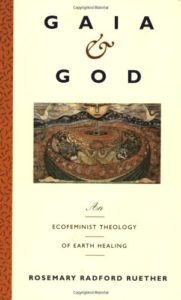 “Gaia and God is an admirably readable, wide-ranging account of world-views, claiming that the past has been too patriarchal and that the present needs a feminist corrective. Each Of four sections–creation, destruction, domination and deceit, and healing–starts in past mythology, in religion, and ends in a contemporary descriptive account, typically with much science. Ruether’s goal is prescriptive and therapeutic. There are three classical creation stories: Babylonian, Hebrew, and Greek, and there is the modern scientific story. There are biblical destructions: the Noah story, prophetic apocalyptic, and the Book of Revelation, somewhat oddly juxtaposed with the ecological crisis as religious ‘fantasy’ versus ecological ‘reality’ (p. 115).”
“Gaia and God is an admirably readable, wide-ranging account of world-views, claiming that the past has been too patriarchal and that the present needs a feminist corrective. Each Of four sections–creation, destruction, domination and deceit, and healing–starts in past mythology, in religion, and ends in a contemporary descriptive account, typically with much science. Ruether’s goal is prescriptive and therapeutic. There are three classical creation stories: Babylonian, Hebrew, and Greek, and there is the modern scientific story. There are biblical destructions: the Noah story, prophetic apocalyptic, and the Book of Revelation, somewhat oddly juxtaposed with the ecological crisis as religious ‘fantasy’ versus ecological ‘reality’ (p. 115).”
Summary Excerpted From:
Rolston, Holmes. “Book Review: Gaia and God: An Ecofeminist Theology of Earth Healing.” Interpretation 48, no. 2 (April 1994): 188–90. https://doi.org/10.1177/002096430004800213.
Publisher’s Website:
https://www.harpercollins.com/products/gaia-and-god-rosemary-r-ruether?variant=32117952315426
Recommended Citation (Chicago):
Ruether, Rosemary R. Gaia and God: An Ecofeminist Theology of Earth Healing. San Francisco: Harper, 1992.
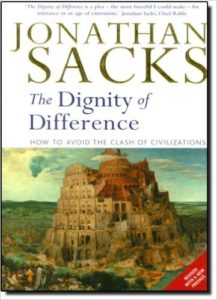 The year 2001 began as the United Nations Year of Dialogue between Civilizations. By its end, the phrase that came most readily to mind was ‘the clash of civilizations.’ The tragedy of September 11 intensified the danger caused by religious differences around the world. As the politics of identity begin to replace the politics of ideology, can religion become a force for peace?
The year 2001 began as the United Nations Year of Dialogue between Civilizations. By its end, the phrase that came most readily to mind was ‘the clash of civilizations.’ The tragedy of September 11 intensified the danger caused by religious differences around the world. As the politics of identity begin to replace the politics of ideology, can religion become a force for peace?
The Dignity of Difference is Rabbi Jonathan Sacks’s radical proposal for reconciling hatreds. The first major statement by a Jewish leader on the ethics of globalization, it also marks a paradigm shift in the approach to religious coexistence. Sacks argues that we must do more than search for values common to all faiths; we must also reframe the way we see our differences.
Summary Source: Bloomsbury Summary
Recommended Citation (Chicago):
Sacks, Jonathan. The Dignity of Difference: How to Avoid the Clash of Civilizations. New York: Continuum, 2003.
 “Standing Again at Sinai: Judaism from a Feminist Perspective is a book remarkable for its clarity and its comprehensive account of feminist responses to Jewish life and thought. As such, and as the first book-length feminist Jewish theology, readable and sophisticated, provocative and judiciously presented , Standing Again at Sinai will be an essential resource to all who are struggling with the question of women’s place in history and in modern life. It should also quickly find its place on syllabi for courses in Judaica at every level of study.
“Standing Again at Sinai: Judaism from a Feminist Perspective is a book remarkable for its clarity and its comprehensive account of feminist responses to Jewish life and thought. As such, and as the first book-length feminist Jewish theology, readable and sophisticated, provocative and judiciously presented , Standing Again at Sinai will be an essential resource to all who are struggling with the question of women’s place in history and in modern life. It should also quickly find its place on syllabi for courses in Judaica at every level of study.
The details of Plaskow’s feminist critique of Judaism are not new. What is new is that these ideas are gathered in a sustained argument that begins by establishing the importance of theology as the place where many of the unarticulated assumptions about Judaism reside. “So long as theology is dismissed as unimportant,” writes Plaskow, “the sexism built into certain basic Jewish ideas is aided and abetted by the neglect of theology” (p. 22). Focusing on Torah, Israel, and God as Judaism’s central categories, Plaskow challenges the assumption that Judaism is a non-theological tradition and therefore emphasizes theology over law and biblical rather than rabbinic Scripture in her analysis of authority in Judaism. She demonstrates that classically Judaism has spoken to and about men, excluding women altogether or regarding woman as Other, part of what must be managed by the systems that men control. Plaskow’s powerful criticism nevertheless compels her readers to proceed towards a Judaism that is inclusive of all Jews. Beginning with the point that for herself she discovers no non-patriarchal space to which she can retreat, as a feminist and a Jew she finds that the next task is to speak the silence that occupies the place of woman in Judaism.”
Summary Source Excerpted From:
Lefkovitz, Lori. Review of Standing Again at Sinai: Judaism from a Feminist Perspective. Shofar: An Interdisciplinary Journal of Jewish Studies 9, no. 2 (1991): 83-85. doi:10.1353/sho.1991.0062.
Publisher’s Website: https://www.harpercollins.com/products/standing-again-at-sinai-judith-plaskow?variant=32139156422690
Recommended Citation (Chicago):
Plaskow, Judith. Standing Again at Sinai: Judaism from a Feminist Perspective. New York: HarperOne, 1991.
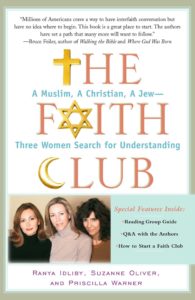 A groundbreaking book about Americans searching for faith and mutual respect, The Faith Club weaves the story of three women, their three religions, and their urgent quest to understand one another.
A groundbreaking book about Americans searching for faith and mutual respect, The Faith Club weaves the story of three women, their three religions, and their urgent quest to understand one another.
When an American Muslim woman befriends two other mothers, one Jewish and one Christian, they decide to educate their children about their respective religions. None of them guessed their regular meetings would provide life-changing answers and form bonds that would forever alter their struggles with prejudice, fear, and anger. Personal, powerful, and compelling, The Faith Club forces readers to face the tough questions about their own religions.
Pioneering, timely, deeply thoughtful, and full of hope, The Faith Club’s caring message will resonate with people of all faiths.
Summary Source: Simon & Schuster Summary
Recommend Citation (Chicago):
Idliby, Ranya, Suzanne Oliver, and Priscilla Warner. The Faith Club: A Muslim, A Christian, A Jew — Three Women Search for Understanding. New York: Atria Books, 2007.
This book is an extended, critical reflection on the state of interrelgious dialogue in its modern version.
While there has been some important writing in the field of comparative theology, there has been no extended, critical reflection on the state of the discipline in its modern version, its strengths and problematic areas as it grows as a serious theological and scholarly discipline. This work of young scholars in conversation with one another, remedies this lack by, as it were, taking the discipline apart and putting it back together again.
The volume seeks to understand how to learn from multiple religions in a way that is truly open to those religions on their own terms, while yet being rooted in the tradition/s that we bring to our interreligious study.
Summary Source: Bloomsbury Summary
Recommended Citation (Chicago):
Clooney, Francis X., ed. The New Comparative Theology: Interreligious Insights from the Next Generation. New York: Continuum, 2010.
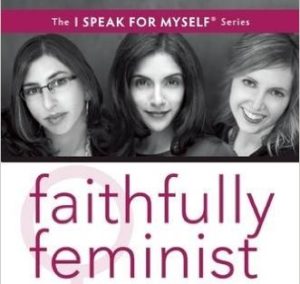 ““Why do you stay?” It is a common question women are asked in relation to their faith. These are not women who buy into Candace Cameron’s biblically submissive theory; rather, these are women who claim a feminist identity, have membership in a particular religious tradition, and practice their faith in spite of gendered challenges.
““Why do you stay?” It is a common question women are asked in relation to their faith. These are not women who buy into Candace Cameron’s biblically submissive theory; rather, these are women who claim a feminist identity, have membership in a particular religious tradition, and practice their faith in spite of gendered challenges.
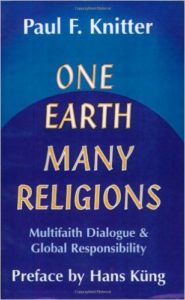 “In One Earth Many Religions Knitter looks back at his own “dialogical odyssey” and forward to the way that interfaith encounters and dialogue must focus attention on new challenges. Nothing less than enlisting the commitment of the world’s religions on the task of saving our common home will do. In making that case, Knitter makes clear the complex structures – political economic, and social as well as religious – that face those who approach this task. While articulating a “this worldly soteriology necessary to overcome our eco-human plight, Knitter offers practical considerations on actions and projects that have and should have been undertaken to stem the tide of environmental and human suffering.”
“In One Earth Many Religions Knitter looks back at his own “dialogical odyssey” and forward to the way that interfaith encounters and dialogue must focus attention on new challenges. Nothing less than enlisting the commitment of the world’s religions on the task of saving our common home will do. In making that case, Knitter makes clear the complex structures – political economic, and social as well as religious – that face those who approach this task. While articulating a “this worldly soteriology necessary to overcome our eco-human plight, Knitter offers practical considerations on actions and projects that have and should have been undertaken to stem the tide of environmental and human suffering.”
Source Summary: Publisher’s Summary
Recommended Citation (Chicago):
Knitter, Paul F. One Earth, Many Religions: Multifaith Dialogue and Global Responsibility. Maryknoll, NY: Orbis, 1995.
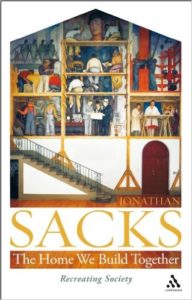 “Multiculturalism has run its course, and it is time to move on.” So begins Jonathan Sacks’ new book on the future of British society and the dangers facing liberal democracy.
“Multiculturalism has run its course, and it is time to move on.” So begins Jonathan Sacks’ new book on the future of British society and the dangers facing liberal democracy.
Arguing that global communications have fragmented national cultures and that multiculturalism, intended to reduce social frictions, is today reinforcing them, Sacks argues for a new approach to national identity. We cannot stay with current policies that are producing a society of conflicting ghettoes and non-intersecting lives, turning religious bodies into pressure groups rather than society-building forces.
Britain, he argues, will have to construct a national narrative as a basis for identity, reinvigorate the concept of the common good, and identify shared interests among currently conflicting groups. It must restore a culture of civility, protect “neutral spaces” from politicization, and find ways of moving beyond an adversarial culture in which the loudest voice wins. He argues for a responsibility- rather than rights-based model of citizenship that connects the ideas of giving and belonging.
Offering a new paradigm to replace previous models of assimilation on the one hand, multiculturalism on the other, he argues that we should see society as “the home we build together”, bringing the distinctive gifts of different groups to the common good. Sacks warns of the hazards free and open societies face in the twenty-first century, and offers an unusual religious defense of liberal democracy and the nation state.
Summary Source: Bloomsbury summary
Recommended Citation (Chicago):
Sacks, Jonathan. The Home We Build Together: Recreating Society. New York: Continuum, 2009.
 “Gaia and God is an admirably readable, wide-ranging account of world-views, claiming that the past has been too patriarchal and that the present needs a feminist corrective. Each Of four sections–creation, destruction, domination and deceit, and healing–starts in past mythology, in religion, and ends in a contemporary descriptive account, typically with much science. Ruether’s goal is prescriptive and therapeutic. There are three classical creation stories: Babylonian, Hebrew, and Greek, and there is the modern scientific story. There are biblical destructions: the Noah story, prophetic apocalyptic, and the Book of Revelation, somewhat oddly juxtaposed with the ecological crisis as religious ‘fantasy’ versus ecological ‘reality’ (p. 115).”
“Gaia and God is an admirably readable, wide-ranging account of world-views, claiming that the past has been too patriarchal and that the present needs a feminist corrective. Each Of four sections–creation, destruction, domination and deceit, and healing–starts in past mythology, in religion, and ends in a contemporary descriptive account, typically with much science. Ruether’s goal is prescriptive and therapeutic. There are three classical creation stories: Babylonian, Hebrew, and Greek, and there is the modern scientific story. There are biblical destructions: the Noah story, prophetic apocalyptic, and the Book of Revelation, somewhat oddly juxtaposed with the ecological crisis as religious ‘fantasy’ versus ecological ‘reality’ (p. 115).”



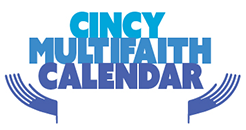
 The year 2001 began as the United Nations Year of Dialogue between Civilizations. By its end, the phrase that came most readily to mind was ‘the clash of civilizations.’ The tragedy of September 11 intensified the danger caused by religious differences around the world. As the politics of identity begin to replace the politics of ideology, can religion become a force for peace?
The year 2001 began as the United Nations Year of Dialogue between Civilizations. By its end, the phrase that came most readily to mind was ‘the clash of civilizations.’ The tragedy of September 11 intensified the danger caused by religious differences around the world. As the politics of identity begin to replace the politics of ideology, can religion become a force for peace? “Standing Again at Sinai: Judaism from a Feminist Perspective is a book remarkable for its clarity and its comprehensive account of feminist responses to Jewish life and thought. As such, and as the first book-length feminist Jewish theology, readable and sophisticated, provocative and judiciously presented , Standing Again at Sinai will be an essential resource to all who are struggling with the question of women’s place in history and in modern life. It should also quickly find its place on syllabi for courses in Judaica at every level of study.
“Standing Again at Sinai: Judaism from a Feminist Perspective is a book remarkable for its clarity and its comprehensive account of feminist responses to Jewish life and thought. As such, and as the first book-length feminist Jewish theology, readable and sophisticated, provocative and judiciously presented , Standing Again at Sinai will be an essential resource to all who are struggling with the question of women’s place in history and in modern life. It should also quickly find its place on syllabi for courses in Judaica at every level of study.  A groundbreaking book about Americans searching for faith and mutual respect, The Faith Club weaves the story of three women, their three religions, and their urgent quest to understand one another.
A groundbreaking book about Americans searching for faith and mutual respect, The Faith Club weaves the story of three women, their three religions, and their urgent quest to understand one another. ““Why do you stay?” It is a common question women are asked in relation to their faith. These are not women who buy into Candace Cameron’s biblically submissive theory; rather, these are women who claim a feminist identity, have membership in a particular religious tradition, and practice their faith in spite of gendered challenges.
““Why do you stay?” It is a common question women are asked in relation to their faith. These are not women who buy into Candace Cameron’s biblically submissive theory; rather, these are women who claim a feminist identity, have membership in a particular religious tradition, and practice their faith in spite of gendered challenges. “In One Earth Many Religions Knitter looks back at his own “dialogical odyssey” and forward to the way that interfaith encounters and dialogue must focus attention on new challenges. Nothing less than enlisting the commitment of the world’s religions on the task of saving our common home will do. In making that case, Knitter makes clear the complex structures – political economic, and social as well as religious – that face those who approach this task. While articulating a “this worldly soteriology necessary to overcome our eco-human plight, Knitter offers practical considerations on actions and projects that have and should have been undertaken to stem the tide of environmental and human suffering.”
“In One Earth Many Religions Knitter looks back at his own “dialogical odyssey” and forward to the way that interfaith encounters and dialogue must focus attention on new challenges. Nothing less than enlisting the commitment of the world’s religions on the task of saving our common home will do. In making that case, Knitter makes clear the complex structures – political economic, and social as well as religious – that face those who approach this task. While articulating a “this worldly soteriology necessary to overcome our eco-human plight, Knitter offers practical considerations on actions and projects that have and should have been undertaken to stem the tide of environmental and human suffering.” “Multiculturalism has run its course, and it is time to move on.” So begins Jonathan Sacks’ new book on the future of British society and the dangers facing liberal democracy.
“Multiculturalism has run its course, and it is time to move on.” So begins Jonathan Sacks’ new book on the future of British society and the dangers facing liberal democracy.